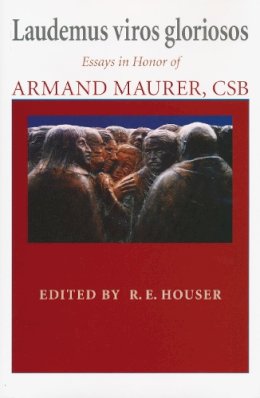
Stock image for illustration purposes only - book cover, edition or condition may vary.
Laudemus Viros Gloriosos: Essays in Honor of Armand Maurer, CSB (Thomistic Studies)
Roger Hargreaves
FREE Delivery in Ireland
Description for Laudemus Viros Gloriosos: Essays in Honor of Armand Maurer, CSB (Thomistic Studies)
Hardcover. Includes fifteen essays presented in honor of one of the premier historians of medieval philosophy, Armand Maurer of the Pontifical Institute for Mediaeval Studies and the University of Toronto. This book demonstrates the importance of Arabic philosophical thought for the Latin West during the scholastic era, which began in the thirteenth century. Editor(s): Houser, R.E. Series: Thomistic Studies. Num Pages: 536 pages, ports. BIC Classification: HPCB. Category: (P) Professional & Vocational. Dimension: 235 x 164 x 29. Weight in Grams: 680.
This book of fifteen essays is presented in honor of one of the premier historians of medieval philosophy, Armand Maurer of the Pontifical Institute for Mediaeval Studies and the University of Toronto. The authors, internationally recognized scholars in the field of medieval philosophy and theology, are friends, colleagues, and students of Fr. Maurer. They are united in a common love of medieval thought and a common appreciation of philosophizing through the study of the history of philosophy. Their interests and methodologies, however, are diverse, and cover a range from Justin Marytr, who died during the reign of Marcus Aurelius, to ... Read moreBartholomew Mastrius, a contemporary of Descartes.
The contributions are arranged chronologically, beginning with John Rist’s essay on Christian philosophy during the patristic era. Richard Taylor demonstrates the importance of Arabic philosophical thought for the Latin West during the scholastic era, which began in the thirteenth century. R. James Long treats the early scholastics Richard Fishacre and Richard Rufus. Following Maurer’s central interest, the majority of the essays (by R. E. Houser, Leo Elders, Lawrence Dewan, David B. Twetten, Mary C. Sommers, and James P. Reilly) treat aspects of the thought of Thomas Aquinas. But just as Maurer did not confine himself to Aquinas, this volume reaches out to other thirteenth-century figures and topics. John Wippel looks at Godfrey of Fontaines, Timothy B. Noone studies the Franciscans Matthew of Aquasparta and Peter John Olivi, and Stephen Brown adds the Franciscan Peter of Candia. Reflecting Maurer’s own interests in fourteenth-century philosophy are the contributions of Calvin Normore on logic and Girard Etzkorn on the Franciscan Francis of Mayronis. The essay by Norman Wells focuses on the Franciscan Batholomew Mastrius. The volume concludes with a wonderful autobiography of his education by Maurer himself and a biliography of Maurer’s writings.
Show Less
Product Details
Publisher
University of Notre Dame Press
Place of Publication
Notre Dame IN, United States
Shipping Time
Usually ships in 7 to 11 working days
About Roger Hargreaves
R. E. Houser is professor of philosophy at the University of St. Thomas and the Center for Thomistic Studies. He is the author and editor of a number of books, including The Cardinal Virtues: Aquinas, Albert, Philip the Chancellor.
Reviews for Laudemus Viros Gloriosos: Essays in Honor of Armand Maurer, CSB (Thomistic Studies)
“This is a volume that honors the memory of Armand Maurer not only by reviewing his own scholarly achievements but by advancing the state of scholarship on the subject that he loved, the philosophy of the middle ages. The range of topics covered here richly reflect the pluralism of medieval thought. Some of the essays gathered for this collection give ... Read morea fresh look at important perennial themes like the nature of Christian philosophy and the real distinction between essence and existence. Others turn—as Maurer loved to do—to figures who are studied less often (Peter of Candia, for example, or Francis of Mayronis) that help fill out our knowledge of this period and add to our sense of the contributions that study of medieval authors can make for contemporary philosophizing.” —Joseph W. Koterski, S.J., Fordham University “This lovely Festschrift for Armand Maurer contains fourteen essays by distinguished scholars on the tradition of medieval philosophy, from its ancient origins to seventeenth-century inheritors. Since many essays treat large-scale movements or fundamental issues, the volume will be useful to serious undergraduates and graduate students, as well as to scholars. Laudemus indeed: from the editor’s moving tribute to Armand Maurer, through discussions of Avicenna and Thomas and Ockham, to Maurer’s closing recollections of his teachers, this volume is full of well-earned praise.” —Donald Morrison, Rice University “These essays compose an enjoyable and enlightening scholarly whole that pays fitting homage to the honoree, sometimes by explicit reference, sometimes by resemblance or relevance to his work. The scholarship of the contributions is first-rate and thoroughly up to date; the prose styles are perspicuous and precise. Experts in medieval philosophy, who constitute the natural audience of the Festschrift, will find much instruction and pleasure in each contribution, and will recognize the collection as a fine tribute to an extraordinary scholar.” —Kevin White, The Catholic University of America “. . . all the contributors are or were ‘friends, students, and colleagues’ of Maurer, and all the essays deal with Maurer’s avocation—medieval philosophy. Although it is a commonplace in reviews of such anthologies to complain of uneven quality, happily in the present case the essays are almost uniformly well-written and well-argued.” —Choice “Fr. Maurer's work at the Pontifical Institute for Medieval Studies and the U. of Toronto has made him a premier historian of medieval philosophy, and here his friends, colleagues and former students provide 15 essays that reflect the range and depth of this studies.” —Reference and Research Book News “This volume is dedicated to one of the most outstanding historians of medieval philosophy of our time: Armand Maurer. . . . [The] carefully organized volume offers a wide range of extremely inspiring essays which reflect many of Maurer’s interests and much of his work. . . . [It] is indeed a manifest proof that Maurer’s important work is being continued by his pupils and friends.” —Notre Dame Philosophical Reviews Show Less

